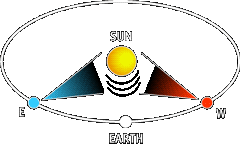

|
|
 Dr.
Craig
describes
coronal mass ejection and the impact of the STEREO mission.
Dr.
Craig
describes
coronal mass ejection and the impact of the STEREO mission.
|
|
For starters, scientists aren’t exactly sure how or why CMEs happen,
though they seem to be associated with sudden, colossal rearrangements of
magnetic fields at the sun’s surface. In the eruptions that result,
enormous loops of matter burst from the sun’s surface and travel into
space.
Coronal
mass ejections are just part of a complicated interplay of forces on the
sun. As steady and placid as the sun may seem, in truth it seethes and sputters,
its surface an ever-changing landscape of violent activity, little of it
well understood.
To study CMEs and other solar activity, scientists at NASA have initiated
the STEREO project. The basic idea is to launch two satellites that will
give us a stereo view of the sun, much as our two eyes give us a stereo
view of the world around us. Three-dimensional images generated by the STEREO
project will reveal details about the shape and composition of coronal mass
ejections.
|
|
|

|
|
|
Aurora
borealis.
Photograph by Dick
Hutchinson©
|
Coronal mass ejections aren’t all bad. The charged particles
they send our way are responsible for auroras, brilliant light displays
created at the north and south poles, (termed aurora borealis and
aurora australis, respectively.) In times of greatest solar activity,
the "Northern Lights" have been visible from as far south
as Arizona.
|

Scheduled
for launch in 2004, the two satellites of the STEREO project will
give us a three-dimensional view of activity on the sun’s surface,
including coronal mass ejections.
Both satellites will share earth’s orbit around the sun. One
will be slightly ahead of the earth, the other slightly behind.
Like a pair of eyes, these satellites will see with "depth
perception," providing 3-D images that are far more informative
than ordinary "flat" pictures.

|
|
